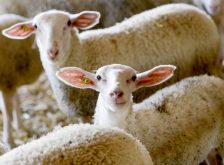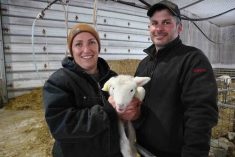Ryan and Romy Schill have big plans for their farm as they embrace many markets for their sheep products.
The Schills, first generation sheep farmers, sell breeding stock around Ontario, lamb for the meat market and wool and wool products out of their farm store and at local and province-wide markets.
Why it matters: The sheep sector has significant market to fill in Canada and most of the increase is coming from incremental growth from existing farmers.
“Ryan worked with his grandparents on this farm. There was a small space in the one barn to do a little project and he bought sheep,” said Romy. “He started with 25, then went to 50, we got out of the pigs, renovated the barn and got more and more and more sheep. Ryan saw the market potential. The pig and cattle markets were so up and down and lamb was always something that looked promising.”
Ryan started with sheep 15 years ago at the farm near Wallenstein. In 2009-10 they renovated the pig barn to house 200 sheep.
“In 2010-11 (we) made the first jump and continued growing to 400. In 2018 (we) jumped off the cliff to 800 sheep,” said Romy. They are keeping one larger group of replacements, and they say they can reach their goal of 900 ewes by this fall.
In 2018, the Schills built a new state of the art 98 by 146 foot barn for their close-up and lambing ewes, who will stay in there with their lambs until weaning time.

The farm still uses the renovated pig barn for replacement ewes and an old bank barn for breeding, finishing lambs and a space for managing the sheep with their chute.
The Schills raise 1,800 lambs per year, half of them sold for breeding stock, 20 per cent of that half used for replacements on their own farm and the other half sold for market, with about 10 per cent of that second half sold privately.
The meat and breeding market has worked out well for the Schills but Romy is trying to use all resources from these animals by diving into the wool industry. It’s not a large opportunity in Ontario, but she is trying to change that for the operation.
Read Also

BinSentry sensors reduce feed-bin outages
BinSentry sensors mean fewer feed bin outages and more efficient deliver for feed mills.
In their new barn two extra rooms were added — one is a store for sales of CircleR wool products and the other is a multi-purpose room for Romy to work on her wool products. She has her wool processed and made into yarn and other wool products, which she sells out of their new farm store and at markets.
“I really like the wool, it allows me to utilize a different side of my brain, a creative side, a different part from doing the daily chores and tasks,” said Romy.
The Schills are also a part of the Upper Canada Fibreshed, a group of 20 to 30 wool producers supplying and sourcing wool products within 400 kilometres of Toronto.
“People are starting to recognize the Fibreshed brand,” said Romy. “The customers like the connection from the consumer to the producer of the wool.”
A processing plant in Michigan, where Romy sends her wool to be handled, is still within 400 km of Toronto. Unfortunately, the wool processors in Ontario have too long of a turnover time, Romy said, adding it can take nearly a year to have the wool spun into yarn and a farmer can only send 10-30 pounds at a time. The processing plant in Michigan was able to return her wool within three to four months, cleaned and formed into yarn.

Romy sent two 250 lb. bags of wool and has about half the weight in yarn returned because most of the weight is lost after the lanolin is washed out and another five to 10 per cent of wool is lost as it is made into yarn.
Romy dyes all the wool herself, but would like to work in the future with a professional dyer.
Aside from selling yarn, wool-based products, and meat out of the store, the Schills found a small market for sheep and lamb hide for rugs in people’s homes.
“We work with a local abattoir and we will pick-up the hide a few days later,” said Romy.
Between feeding 800 ewes once a day, sorting and managing the animals, it’s enough work for two people. However, Romy is currently the only one who works on the farm full-time. Ryan has a full-time job off the farm. His employers allow him to return home when possible, but the Schill family is hoping Ryan can be home full-time soon to help with the daily work.
More information can be found at www.circlerlamb.ca and at www.uppercanadafibreshed.ca.















